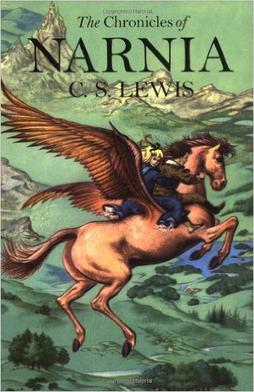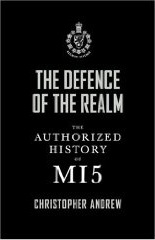
The Chronicles of Narnia is a series of seven portal fantasy novels by British author C. S. Lewis. Illustrated by Pauline Baynes and originally published between 1950 and 1956, the series is set in the fictional realm of Narnia, a fantasy world of magic, mythical beasts and talking animals. It narrates the adventures of various children who play central roles in the unfolding history of the Narnian world. Except in The Horse and His Boy, the protagonists are all children from the real world who are magically transported to Narnia, where they are sometimes called upon by the lion Aslan to protect Narnia from evil. The books span the entire history of Narnia, from its creation in The Magician's Nephew to its eventual destruction in The Last Battle.
BAE Systems plc is a British multinational aerospace, defence and information security company, based in London, England. It is the largest manufacturer in Britain as of 2017. It is the largest defence contractor in Europe and the seventh-largest in the world based on applicable 2021 revenues. Its largest operations are in the United Kingdom and in the United States, where its BAE Systems Inc. subsidiary is one of the six largest suppliers to the US Department of Defense. Its next biggest markets are Saudi Arabia, then Australia; other major markets include Canada, Japan, India, Turkey, Qatar, Oman and Sweden. The company was formed on 30 November 1999 by the £7.7 billion purchase of and merger of Marconi Electronic Systems (MES), the defence electronics and naval shipbuilding subsidiary of the General Electric Company plc (GEC), with British Aerospace, an aircraft, munitions and naval systems manufacturer.

Alan Kenneth Mackenzie Clark was a British Conservative Member of Parliament (MP), author and diarist. He served as a junior minister in Margaret Thatcher's governments at the Departments of Employment, Trade and Defence. He became a member of the Privy Council of the United Kingdom in 1991.

The Type 45 destroyer, also known as the D or Daring class, is a class of six guided-missile destroyers built for the United Kingdom's Royal Navy in the early 21st century. The class is primarily designed for anti-aircraft and anti-missile warfare and is built around the PAAMS air-defence system using the SAMPSON Active electronically scanned array (AESA) and the S1850M long-range radars. The first three destroyers were assembled by BAE Systems Surface Fleet Solutions from partially prefabricated "blocks" built at different shipyards; the remaining three were built by BAE Systems Maritime – Naval Ships. The first ship in the Daring class, HMS Daring, was launched on 1 February 2006 and commissioned on 23 July 2009.

Al Yamamah is the name of a series of record arms sales by the United Kingdom to Saudi Arabia, paid for by the delivery of up to 600,000 barrels (95,000 m3) of crude oil per day to the British government. The prime contractor has been BAE Systems and its predecessor British Aerospace. The first sales occurred in September 1985 and the most recent contract for 72 Eurofighter Typhoon multirole fighters was signed in August 2006.

The River class is a class of offshore patrol vessels built primarily for the Royal Navy of the United Kingdom. A total of nine were built for the Royal Navy (RN), four Batch 1 and five Batch 2. One Batch 1 (HMS Clyde), which was the Falklands guard ship, was decommissioned and transferred at the end of its lease to the Royal Bahrain Naval Force.
Brigadier Allan Lawrence Mallinson is an English author and retired British Army officer.

Sir Max Hugh Macdonald Hastings is a British journalist and military historian, who has worked as a foreign correspondent for the BBC, editor-in-chief of The Daily Telegraph, and editor of the Evening Standard. He is also the author of thirty books, most significantly histories, which have won several major awards. Hastings currently writes a bimonthly column for Bloomberg Opinion and contributes to The Times and The Sunday Times.

"Lions led by donkeys" is a phrase used to imply a capable group of individuals are incompetently led. Coined in classical antiquity, the phrase was commonly used after World War I to contrast senior commanders who had led armies, most prominently those of the British Armed Forces, with the men they commanded. The historiography of the United Kingdom during the 20th century frequently described the infantry of the British Army as brave soldiers (lions) being sent to their deaths by incompetent and indifferent commanders (donkeys).

The Hobart class is a ship class of three air warfare destroyers (AWDs) built for the Royal Australian Navy (RAN). Planning for ships to replace the Adelaide-class frigates and restore the capability last exhibited by the Perth-class destroyers began by 2000, initially under acquisition project SEA 1400, which was re-designated SEA 4000. Although the designation "Air Warfare Destroyer" is used to describe ships dedicated to the defence of a naval force from aircraft and missile attack, the destroyers are expected to also operate in anti-surface, anti-submarine, and naval gunfire support roles.

John Russell Fearn was a British writer, one of the first to appear in American pulp science fiction magazines. A prolific author, he published his novels also as Vargo Statten and with various pseudonyms including Thornton Ayre, Polton Cross, Geoffrey Armstrong, John Cotton, Dennis Clive, Ephriam Winiki, Astron Del Martia.

John Semer Farnsworth was a United States Navy officer who was convicted of spying for Japan during the 1930s. He was identified as Agent K in radio messages intercepted by the Office of Naval Intelligence (ONI).
Allan Johnstone Massie is a Scottish journalist, columnist, sports writer and novelist. He is a Fellow of the Royal Society of Literature. He has lived in the Scottish Borders for the last 25 years, and now lives in Selkirk.

The Boy in the Striped Pyjamas is a 2006 historical fiction novel by Irish novelist John Boyne. The plot concerns a German boy named Bruno whose father is the commandant of Auschwitz and Bruno's friendship with a Jewish detainee named Shmuel.

Beatrice Hastings was the pen name of Emily Alice Haigh, an English writer, literary critic, poet and theosophist. Her work was integral to British magazine The New Age which she helped edit along with her lover, A. R. Orage, prior to the outbreak of World War I. Hastings was also friend and lover of Katherine Mansfield, whose work was first published in The New Age. She also had love affairs with Wyndham Lewis and Amedeo Modigliani.
Con Coughlin is a British journalist and author, currently The Daily Telegraph defence editor.

Aslan is a major character in C. S. Lewis's The Chronicles of Narnia series. Unlike any other character in the Narnian series, Aslan appears in all seven chronicles. Aslan is depicted as a talking lion and is described as the King of Beasts, the son of the Emperor-Over-the-Sea, and the King above all High Kings in Narnia.

The Defence of the Realm: The Authorized History of MI5, published in the United States as Defend the Realm, is an authorised history of the British Security Service (MI5), written by historian Christopher Andrew. Andrew was commissioned in December 2002 to write the history for MI5's 100th anniversary in 2009. He was given "virtually unrestricted access" to much of MI5's files, and "no restriction" on whatever conclusions he decided to draw from them. The book reported, amongst other things, that MI5 kept a file on Prime Minister Harold Wilson, as well as noting how many of Wilson's MP's were spying for the Soviet bloc. The book's title was derived from MI5's Latin motto, Regnum Defende. Historian Keith Jeffery was commissioned to write a similar authorised history of the Secret Intelligence Service (MI6) for release in 2010.

The Deceivers: Allied Military Deception in the Second World War, by Thaddeus Holt, is a 2004 historical account of Allied military deception during the Second World War. The book focuses primarily on the work of Dudley Clarke in the Middle East, John Bevan in London, Newman Smith in Washington, and Peter Fleming in the Far East, detailing their work in creating strategic and tactical deceptions for the Allied forces.

Exercise Spring Train was an annual Royal Navy-led NATO maritime exercise conducted in the Eastern Atlantic. It is most notable for the 1982 exercise which involved seven warships that were subsequently sent to the South Atlantic after the Argentine invasion of the Falkland Islands. Because the vessels involved already had full crews and were able to crossdeck supplies from other ships in the exercise the British response was more rapid than would have otherwise been possible. Two of the vessels involved in the exercise, the Type 42 destroyers Sheffield and Coventry, were sunk during the war. There has been speculation that some of the ships sent to the Falklands from Exercise Spring Train were carrying tactical nuclear weapons, which were routinely carried when on NATO deployments. The 1983 edition of the exercise was criticised by the Spanish and Soviet government who considered it provocative.















